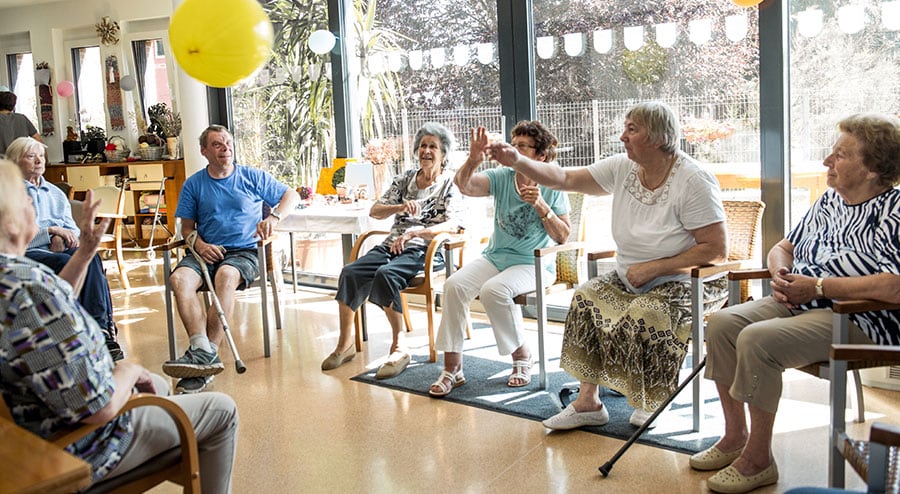Finding the Right Assisted Living Service for Tailored Memory Care Programs
The procedure of choosing an ideal assisted living option for customized memory care programs calls for a nuanced understanding of private needs, specifically as they relate to cognitive problems such as Alzheimer's and dementia. As we check out these factors, the question stays: what truly makes up an optimum environment for memory treatment?
Understanding Memory Care Demands
Understanding the special memory treatment needs of people with cognitive problems is important for providing efficient assistance and boosting lifestyle. Cognitive disabilities, consisting of Alzheimer's condition and other forms of mental deterioration, significantly impact a person's capacity to process information, interact, and preserve freedom. Consequently, tailored methods are necessary in dealing with these difficulties.
People with memory problems frequently experience confusion, state of mind fluctuations, and disorientation, necessitating a helpful and structured atmosphere. Memory care programs need to concentrate on producing a secure room that encourages social interaction, cognitive engagement, and emotional well-being. This can be achieved through specialized tasks, such as memory video games, art treatment, and memory sessions, which advertise cognitive excitement and protect personal identity.

Reviewing Personnel Credentials
The certifications of team member in memory care programs are essential to providing top quality assistance for individuals with cognitive disabilities. Evaluating personnel qualifications includes assessing both academic background and functional experience in geriatric treatment, specifically in memory-related problems such as Alzheimer's and other types of mental deterioration.
Seek staff who have appropriate certifications, such as Qualified Mental Deterioration Professional (CDP) or specialized training in memory treatment. These credentials indicate a commitment to recognizing the intricacies of cognitive decline and effective communication methods customized to residents' distinct requirements. Furthermore, inquire concerning ongoing training opportunities that employee take part in, as continual education and learning is essential in a field that develops quickly with brand-new study and ideal techniques.
Moreover, analyze the staff-to-resident proportion, as this directly impacts the quality of treatment. Eventually, a well-qualified team is extremely important in cultivating a setting that improves the dignity and quality of life for individuals in memory treatment.
Relevance of Personalized Care Plans
Customized treatment plans play a vital role in enhancing the health of individuals in memory treatment programs. These plans are customized to the distinct demands, preferences, and abilities of each citizen, making sure that care is both relevant and reliable. By considering variables such as medical background, cognitive function, and personal passions, caregivers can produce an extensive strategy that promotes dignity and regard for each person.
The value of individualized treatment strategies extends beyond basic care requirements; they cultivate a complacency and knowledge, which is essential for individuals experiencing memory challenges. By dealing with particular behavioral patterns and psychological actions, caretakers can apply approaches that reduce anxiety and improve overall lifestyle.
Additionally, customized care plans help with much better interaction amongst personnel, relative, and doctor. This collaborative method guarantees that everybody included is notified and lined up in their care efforts, resulting in more consistent and efficient support. Eventually, a well-structured customized treatment strategy is necessary in memory treatment programs, as it not just improves day-to-day living experiences yet additionally adds to the long-lasting health and wellness and joy of citizens.
Engaging Activities and Programs

Activities such as art therapy, songs sessions, and reminiscence treatment give opportunities for self-expression and cognitive engagement. These deliberate interactions not only aid in protecting cognitive capabilities but additionally use emotional advantages, minimizing feelings of seclusion and anxiety that often go along with memory loss.
In addition, structured team activities can urge socialization, which is critical for psychological health - Assisted Living. Regular engagement in games, workout classes, and neighborhood getaways produces an atmosphere of friendship and support. Customized programs that consider private rate of interests and histories better enhance involvement, making tasks extra significant and effective
Incorporating modern technology, such as memory games and virtual reality experiences, can additionally offer to improve the every day lives of homeowners, supplying ingenious ways to boost cognitive feature. Ultimately, a concentrate go to my blog on interesting activities and programs is important for promoting an encouraging environment that promotes alternative health in memory treatment settings.

Assessing Community Atmosphere
When evaluating a neighborhood atmosphere for memory treatment programs, it is essential to think about variables that contribute to the general wellness and safety and security of residents. The physical layout of the neighborhood must focus on ease of access and navigating, decreasing barriers while providing clear signage and familiar sites. A safe setting is important to prevent locals from roaming, which can present security dangers.
Furthermore, the sensory elements of the neighborhood, such as illumination, color pattern, and noise levels, play a considerable function in improving comfort and decreasing stress and anxiety among locals. Natural light and outdoor rooms advertise involvement with nature, cultivating a comforting ambience that can profit cognitive function.
One more essential aspect is the availability of trained team that comprehend the special requirements of individuals with memory impairments. Team needs to be furnished to produce a nurturing environment that encourages social interaction and psychological assistance.
Lastly, the sense of area and belonging is crucial. Involving family participation and possibilities for locals to form links with peers can dramatically enhance their general high quality of life. Memory Care. By thoroughly analyzing these factors, family members can make educated choices regarding the most ideal memory care area for their liked ones
Conclusion
In verdict, choosing an appropriate assisted living option for tailored memory treatment programs necessitates a thorough assessment of specific needs and choices. Prioritizing team qualifications, individualized treatment strategies, engaging activities, and an encouraging community setting is important for boosting the lifestyle for homeowners facing cognitive difficulties. By resolving these vital variables, families can make sure that their enjoyed ones receive the needed assistance and care to promote psychological well-being and cognitive stimulation in a nurturing setting.